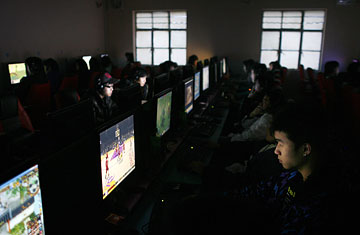
Customers fill an Internet café in Shanghai on Jan. 5, 2009
The year 2009 will not be remembered as the year Chinese censors decided to lighten up. This week, the Chinese agency that oversees the country's Internet-domain-name registry announced it will limit the system to use by businesses, effectively excluding private citizens from registering new domains. The new rules, which the China Internet Network Information Center (CNNIC) put into place on Dec. 14, are meant to restrict online pornography. But some new-media experts say they may add another tool to the country's array of Internet controls. "Many believe that the crackdown on porn was just an excuse," says Isaac Mao, a Chinese blogger and a fellow at Harvard's Berkman Center for Internet and Society. "The real reason has to do with the various goals of Internet censorship, one of which is to curb the individual's voice."
Web censorship in China is rarely an all-or-nothing endeavor. When a site begins to carry too many materials or too much commentary that the authorities find objectionable, it will get blocked if based overseas, or highly restricted or possibly closed if it's based in China. Web users move on to new haunts or find new routes to old ones. But by plugging enough holes and muffling enough dissenting voices, China's Communist Party curbs online opposition to its rule while still allowing the Internet to be open enough to not dangerously impede commerce.
It is a tricky balance, especially in a year that saw a series of sensitive anniversaries. March marked one year after riots broke out in the Tibetan capital of Lhasa; June was the 20th anniversary of the Tiananmen crackdown; and — biggest of all — on Oct. 1, China marked the 60th anniversary of the founding of the People's Republic. Online censorship followed each in near lockstep. China blocked YouTube in March, Twitter in June and various proxy and virtual-private-network services — used to bypass domestic blocks and access to overseas websites — ahead of the National Day celebration. China's Web censors blocked Facebook in July after unrest broke out in Urumqi, the capital of Xinjiang. Average users in that northwestern region have been without Internet access for the past five months, a rare blackout amid China's tendency for more targeted censorship methods.
This week's move by CNNIC to limit registrations to licensed businesses will affect domains ending in .cn. There are now nearly 13 million .cn domain names, about 80% of the total websites registered in China. The policy came after state broadcaster China Central Television, which has targeted search engines such as Google and China's Baidu.com in several reports this year about the prevalence of online porn, turned its attention to what it described as CNNIC's lax standards for regulating Chinese domains. The .cn domain is a leading source of online fraud, according to the Internet-security firm McAfee, and the heightened requirements for registration could help ease that problem.
But experts on the Internet in China point out that pornography crackdowns often ensnare many other types of speech that Beijing finds objectionable. This spring, for example, the Ministry of Information Technology launched plans for the mandatory installation of software on new computers that would block users from visiting porn sites. Studies of the sites that would be restricted by the software, known as the Green Dam Youth Escort, found that many of them were political and not pornographic.
The Green Dam plan was curtailed following complaints from Internet users and foreign computer manufacturers that it would excessively restrict Web surfing and would allow a dangerous gateway for computer viruses. The new domain-registering restrictions have also prompted complaints. "The point is that there is no law that allows for this," wrote a commenter on a forum at Tianya, a Chinese Web forum. "As a government organization, why can the CNNIC disregard the laws?" Another Chinese commenter described the move as "the most substantial Internet censorship campaign I've seen."
But unlike the Green Dam incident, there is no sign yet that the authorities plan to reverse course. Chinese who want to get around the restrictions can do so fairly easily by registering .com domains overseas, but some analysts say that avenue might soon be restricted as well. "The new regulation also sends a signal that there might be more restrictions down the road," says Mao. "One plausible step is to talk with foreign organizations and have them make it harder for Chinese users to register for other domain names." If that happens, Chinese Web users will find one more door to free speech closed.
— With reporting by Jessie Jiang
